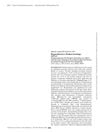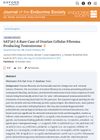 195 citations,
May 2003 in “Obstetrics and gynecology (New York. 1953. Online)/Obstetrics and gynecology”
195 citations,
May 2003 in “Obstetrics and gynecology (New York. 1953. Online)/Obstetrics and gynecology” Most women with excess hair growth have an underlying hormonal issue, often treated with medication and hair removal methods.
[object Object]  47 citations,
December 2000 in “Archives of Dermatological Research”
47 citations,
December 2000 in “Archives of Dermatological Research” Androgens significantly affect female hair loss, and hormonal treatments may help.
 9 citations,
July 1995 in “Veterinary Clinics of North America: Small Animal Practice”
9 citations,
July 1995 in “Veterinary Clinics of North America: Small Animal Practice” The document concludes that hair loss in cats is caused by various factors, including allergies, mites, infections, and hormonal issues, with treatments varying accordingly.
 1 citations,
January 2019 in “Medical principles and practice”
1 citations,
January 2019 in “Medical principles and practice” A boy's hair loss improved after tumor removal and vitamin D treatment, but hair loss returned despite normal vitamin D and no tumor regrowth.
 January 2024 in “Biomedicines”
January 2024 in “Biomedicines” Using stem cells from hair follicles to treat female hair loss is safe and effective after six months.
 November 2023 in “International journal of reproduction, contraception, obstetrics and gynecology”
November 2023 in “International journal of reproduction, contraception, obstetrics and gynecology” Polycystic ovary syndrome causes high male hormone levels, leading to symptoms like excess hair, acne, and fertility problems.
[object Object] September 2021 in “Journal of pharmaceutical research international” The conclusion is that hirsutism is strongly linked to PCOS and higher levels of certain hormones, but not to DHEAS, prolactin, cortisol, or TSH.
 January 2008 in “Annals of Nutrition and Metabolism”
January 2008 in “Annals of Nutrition and Metabolism” Parthenolide promotes hair growth in mice and may influence pathways related to male pattern baldness.
 53 citations,
December 2015 in “JAMA Dermatology”
53 citations,
December 2015 in “JAMA Dermatology” Women with PCOS often have more body hair, acne, and skin darkening, and these signs are linked to metabolic issues like insulin resistance and high cholesterol.
 29 citations,
February 2017 in “International Journal of Women's Dermatology”
29 citations,
February 2017 in “International Journal of Women's Dermatology” Women with excessive male-pattern hair growth should get a full hormone check-up to find and treat any underlying issues, considering both medical and emotional aspects.
 5 citations,
June 2015 in “International Journal of Women's Dermatology”
5 citations,
June 2015 in “International Journal of Women's Dermatology” Hirsutism, excessive hair growth in women, is often caused by PCOS and can be managed with medication and personalized treatment plans.
 5 citations,
January 2014 in “Postepy Dermatologii I Alergologii”
5 citations,
January 2014 in “Postepy Dermatologii I Alergologii” Hormonal treatments like birth control pills can improve acne in women with excess hair growth and hormone imbalances.
 August 2009 in “International Journal of Dermatology”
August 2009 in “International Journal of Dermatology” A postmenopausal woman's facial redness, acne, and excess hair were caused by too much hormone therapy for insomnia, but improved after stopping the treatment.
 48 citations,
February 2013 in “Molecular and Cellular Endocrinology”
48 citations,
February 2013 in “Molecular and Cellular Endocrinology” The protein StAR is found in 17 different organs and can affect hair loss and brain functions, but its full role is not yet fully understood.
 43 citations,
May 1986 in “Clinics in Endocrinology and Metabolism”
43 citations,
May 1986 in “Clinics in Endocrinology and Metabolism” Cyproterone acetate is effective for treating hirsutism and acne but less so for hair loss, with side effects similar to birth control pills.
 2 citations,
December 2021 in “Case reports in endocrinology”
2 citations,
December 2021 in “Case reports in endocrinology” The girl's condition improved with treatment, showing no new autoimmune diseases and hair regrowth.
 60 citations,
October 2014 in “Journal of the American Academy of Dermatology”
60 citations,
October 2014 in “Journal of the American Academy of Dermatology” Dermatologists play a key role in treating skin symptoms of PCOS like dark patches, excess hair, acne, and hair loss.
 January 2008 in “Pratique médicale & chirurgicale de l'animal de compagnie”
January 2008 in “Pratique médicale & chirurgicale de l'animal de compagnie” Alopecia X in dogs is a cosmetic issue, not a hormonal disorder, and harmful treatments should be avoided.
 October 2007 in “Postgraduate obstetrics & gynecology”
October 2007 in “Postgraduate obstetrics & gynecology” Testosterone therapy can help with androgen deficiency in women but should be used with caution and monitoring due to potential risks.
 162 citations,
April 2016 in “The Lancet Diabetes & Endocrinology”
162 citations,
April 2016 in “The Lancet Diabetes & Endocrinology” Testosterone therapy in transgender men has both desired effects like increased muscle mass and potential health risks such as higher cardiovascular risk.
 67 citations,
May 2018 in “Journal of Ginseng Research”
67 citations,
May 2018 in “Journal of Ginseng Research” Red ginseng may improve immunity, fatigue, memory, blood circulation, and menopausal symptoms, and is generally safe to consume.
 2 citations,
August 2011 in “Revista Medica De Chile”
2 citations,
August 2011 in “Revista Medica De Chile” A postmenopausal woman's high testosterone levels and symptoms improved after removing a tumor from her ovary.

Benign ovarian tumors can cause excess male hormones and related conditions in postmenopausal women.
 November 2022 in “Journal of the Endocrine Society”
November 2022 in “Journal of the Endocrine Society” A woman's masculine symptoms were caused by a rare tumor in her left ovary, which was found using a special blood test.
 January 2011 in “Journal of pediatric endocrinology & metabolism/Journal of pediatric endocrinology and metabolism”
January 2011 in “Journal of pediatric endocrinology & metabolism/Journal of pediatric endocrinology and metabolism” Hyperthyroidism can hide signs of high androgen levels in females.
 151 citations,
December 2004 in “Annals of the New York Academy of Sciences”
151 citations,
December 2004 in “Annals of the New York Academy of Sciences” Congenital Adrenal Hyperplasia is a genetic disorder with two forms, causing symptoms like early puberty and severe acne, but can be identified through screening and treated with glucocorticoids.
 5 citations,
January 2020 in “The mental health clinician”
5 citations,
January 2020 in “The mental health clinician” Vitamin D supplements may reduce hair-pulling in people with Trichotillomania.
 January 2013 in “Revista Clínica Española”
January 2013 in “Revista Clínica Española” A postmenopausal woman's increased male hormone levels were successfully treated with surgery.
 26 citations,
January 2000 in “Hormone research in paediatrics”
26 citations,
January 2000 in “Hormone research in paediatrics” Insulin resistance is linked to high male hormone levels in women, often seen in those with PCOS.
 October 2023 in “Journal of the Endocrine Society”
October 2023 in “Journal of the Endocrine Society” A woman's ovarian fibroma caused high testosterone levels, which normalized after surgery.





























